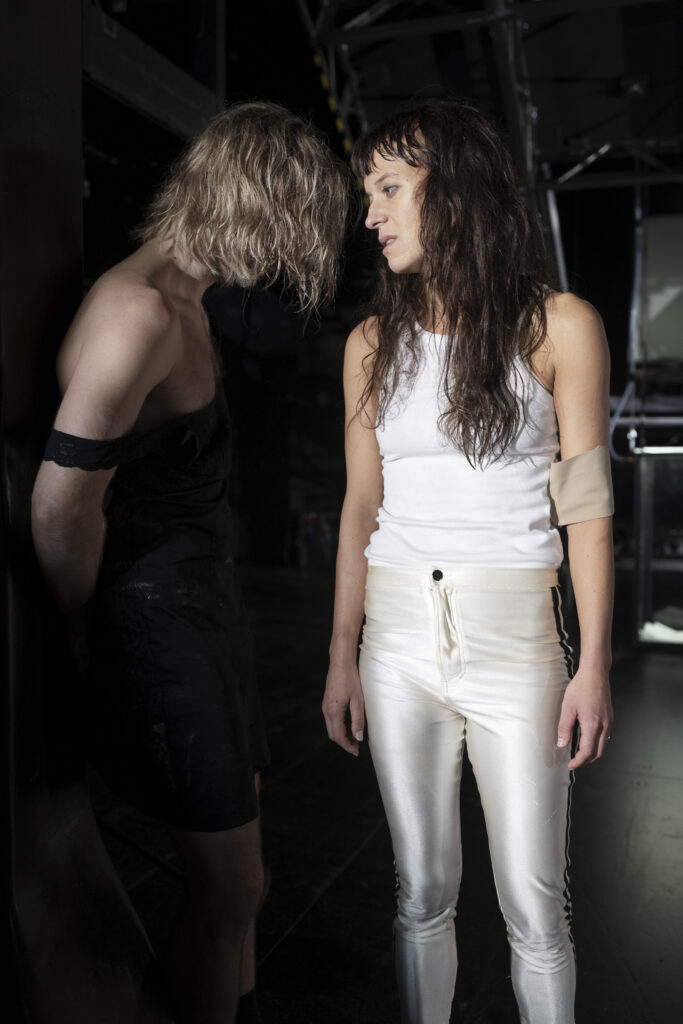Director Felicitas Brucker has restaged Henrik Ibsen’s classic 19th-century play with excerpts by three contemporary authors: Sivan Ben Yishai, Gerhild Steinbuch, and Ivna Žic.
Their „Nora“ is the second part of a double feature, being shown together with a staging of „Die Freiheit einer Frau“, based on the contemporary prose of Édouard Louis. Given the prestigious nature of the Theatertreffen, it is not surprising that only one of the two plays – the one based on the classic drama – was given the chance to be shown on the main stage of the Berliner Festspiele.
„Nora“, in its 21st-century version, does not differ much from the original. The immediate reason for her emancipation is still a fraud in the form of a forged signature – or rather, its discovery by her husband. The fraud is used to obtain a loan from a bank. The money is intended to save the health – and even the life – of Nora’s overburdened husband, Torvald. The protagonist uses the money to finance a year-long health cure abroad for the whole family.
In light of the current feminist revolution in Iran, and after the protests for reproductive justice in Poland or the United States, the problem Nora faces seems a triviality that has little to do with the lives of many today. The classical structure of modern drama does not make it easy to understand the director’s motives for treating the issue of feminist emancipation as if the majority of society still lived in the bourgeois conditions of the nineteenth century.
Nora – played by Katharina Bach – is a mother and wife who moves from her father’s house to her husband’s, almost without any agency on her part. She doesn’t have to get a job, because her husband, a clerk and later a bank director, earns enough to provide for a family of five, a villa, a nanny, and many – but not all – of the necessities of life for an upper-middle-class metropolitan family. The theme of economic privilege in which the protagonist operates seems self-evident, and the dramatic burning of her own house at the end of the play a necessary gesture to free herself from the shackles of patriarchy.
Thanks to feminist critique, especially in its materialist version, we have known that the private is political for at least half a century. That it is not enough to change oneself in order to emancipate oneself from exploitation, and break through the oppression embedded and reproduced in social structures – even if leaving the paternalistic partner is always a step in the right direction.
For long-term change, it is necessary to overcome atomization, and see one’s own fate in the context of similar stories, to seek alliances with other oppressed subjects – not just those who identify as women. But Felicitas Brucker’s Nora is not interested in questioning the system; she is a self-absorbed, manipulative, middle-class woman. She treats people of lower social status with arrogance: she appropriates the only line of text attributed to the postman in the drama, and responds to her friend Kristina’s story of hard work and the loss of loved ones by bragging about her wealth, and her children playing in the garden.
Her emancipation means fulfilling the neoliberal dream of being independent, free from obligations to her relatives and to the society. The problem is that, as a non-working wife and mother who burned down the house that both constrained her and provided her with very concrete security, Nora does not have many options for asserting herself in the neoliberal world. What is available to her are unemployment benefits, a job in the service sector, or some other low-paid job that does not require experience or special skills.
Emancipation is unfortunately a long-term process and not a pseudo-revolutionary act of destruction with „fuck the patriarchy“ on its lips. It is the continuation of both feminist and class struggles that have been going on for more than a century. I’m keeping my fingers crossed for a politically- and socially-conscious Nora, who is able to deal with the realities of capitalist life in a self-determined way, and I’m curious to see who she will become in the future.
